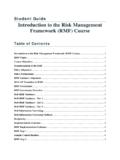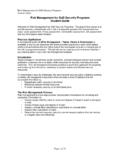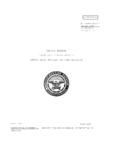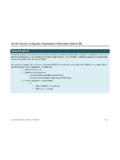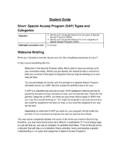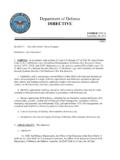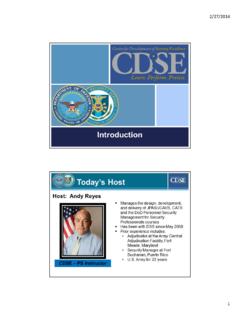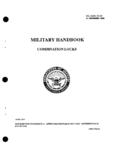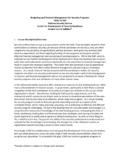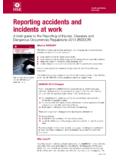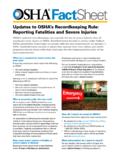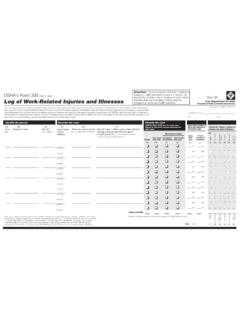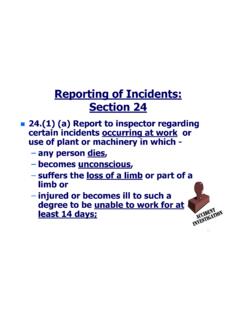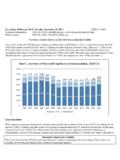Transcription of Student Guide Adverse Information Reporting …
1 Student Guide Adverse Information Reporting short Introduction You've seen them in the news: Aldrich Ames Ana Montes Robert Hanssen Nidal Hasan Bradley Manning You know the harm they've done: Fort Hood Shooting Claims 13 Lives WikiLeaks Publishes National Defense Information Details of Top Secret NSA Surveillance Program Leaked But did you know they all displayed signs of Adverse behavior before committing their crimes? Excessive alcohol consumption Untreated mental health problems Financial indebtedness Unreported foreign travel Unauthorized attempts to access sensitive Information or systems And did you know their supervisors and their coworkers were required to report those signs? If they had reported, they may have helped prevent these acts, protecting our nation's security and even saving lives.
2 Do you know about your responsibility to report behaviors of a security concern? Center for Development of Security Excellence Page 1. Adverse Information Reporting short Student Guide Activity 1. Jerome is a cleared employee in your office. He frequently has the smell of alcohol on his breath and recently displayed signs of intoxication in the workplace. Who is responsible for Reporting this Information ? Select all that apply. Then check your answer in the Answer Key at the end of this Student Guide . Jerome must self report Jerome's coworkers Jerome's manager or commander Security personnel Who Must Report? When we witness a coworker displaying behavior that may constitute a security concern, it's easy to tell ourselves that it's none of our business or to believe that someone else, like our manager or security personnel, will report the Information .
3 Similarly, when we experience circumstances in our own lives that are of security concern, it's understandable we would be hesitant to report that Information for fear we'll endanger our eligibility for access to classified Information , or even our jobs. However, as a cleared employee, you as well as your managers, supervisors, commanders, and coworkers, have a responsibility to report behaviors of a security concern, whether you commit them yourself or observe someone else s behavior. Reporting Adverse Information is essential for preventing damage to our national security and loss of life at the hands of those entrusted with our nation's secrets. This Student Guide will teach you what you need to know to fulfill your responsibility for Adverse Information Reporting . Activity 2. You and your coworkers witness another cleared employee, Gary, exhibiting bizarre and paranoid behavior.
4 He claims to hear voices and says that people are watching and following him. Should you report this behavior? Select the best response. Check your answer in the Answer Key at the end of this Student Guide . o Yes, most bizarre and paranoid behavior must be reported as Adverse Information . o No, psychological conditions are an individual's private health Information and cannot be reported. Center for Development of Security Excellence Page 2. Adverse Information Reporting short Student Guide o Yes, but only if Gary is not currently receiving mental health treatment. What to Report? What kinds of behaviors or incidents are considered Adverse Information ? Your coworker exhibiting bizarre and paranoid behavior, your boss experiencing significant unreported financial problems, or someone who appears to be living above their means.
5 These behaviors or incidents may call into question an individual's ability to protect classified Information . Concerns about someone's allegiance to the United States or potential foreign influence or preference. These concerns raise questions regarding an individual's loyalty to the And finally, criminal or other questionable behavior. Such behavior raises doubts about an individual's reliability, trustworthiness, and judgment in protecting national security. These issues and concerns all relate to the 13 adjudicative guidelines: 1. Allegiance to the 2. Foreign Influence 3. Foreign Preference 4. Sexual Behavior 5. Personal Conduct 6. Financial Considerations 7. Alcohol Consumption 8. Drug Involvement and Substance Misuse 9. Psychological Conditions 10. Criminal Conduct 11. Handling Protected Information 12.
6 Outside Activities 13. Use of Information Technology DoD national security adjudicators use the guidelines to make eligibility determinations regarding an individual's access to classified Information or assignment to sensitive duties. But the DoD's interest in potential issues does not stop once an adjudicator has made a security eligibility determination. Center for Development of Security Excellence Page 3. Adverse Information Reporting short Student Guide As a cleared employee, you have agreed to report any Adverse Information or issues of concern, in or out of the workplace that would require the designated security official to prepare an incident report. Specifically, you must report any Information regarding your own or others' behavior that is not consistent with, or that violates, the 13 adjudicative guidelines.
7 See the DSS Guide : Receive and Maintain Your Security Clearance . Activity 3. Marie often reports to work late, her work does not reflect attention to detail, and she does not pull her weight on team projects. Should you report this behavior? Select the best response. Check your answer in the Answer Key at the end of this Student Guide . o Yes, her poor performance and frequent tardiness warrants Reporting . o No, most performance and time/attendance issues are not of security concern and should not be reported as Adverse Information . What Not to Report? As important as Adverse Information Reporting is, it is just as important to recognize circumstances that normally do not warrant an incident report, and thus you should not report as Adverse Information . Examples include HR or time and attendance issues, such as Marie's lateness and poor performance.
8 Other examples are changes in personal status, such as marriage, cohabitation, or divorce. You are required to report such changes in your own personal status on an SF- 86C, but they are NOT considered Adverse Information and do not require an incident report unless the marriage or cohabitation involves a foreign national. By only Reporting incidents or behaviors directly related to the 13 adjudicative guidelines, you save DoD resources because adjudicators will not spend time making unnecessary continued eligibility determinations. In addition, it avoids the possible unnecessary suspension of an employee's access pending the outcome of such a determination. Activity 4. Dina, a DoD civilian employee with Secret access, was caught attempting to obtain coworker's passwords to her agency's classified network.
9 She resigned and her agency security officer terminated her access to classified Information . Do security personnel need to submit an incident report? Select the best response. Check your answer in the Answer Key at the end of this Student Guide . Center for Development of Security Excellence Page 4. Adverse Information Reporting short Student Guide o Yes, Dina's eligibility for Secret access to classified Information is still current, and she may secure employment elsewhere. o No, Dina's employer terminated her access to classified Information , and she no longer works at the agency, so no further action is required. When and How to Report? When Adverse Information arises, it is important to report it immediately, even if the individual who engaged in the behavior was terminated from her position.
10 Although all cleared employees are subject to periodic reinvestigation, do not wait until then to report issues of concern. Years could pass and significant damage could occur before serious issues are adjudicated. Even if an employee no longer has access to classified Information or no longer works for the agency or company, report Adverse Information about that individual to your agency's security personnel or your company's Facility Security Officer. If security personnel don't record an incident report in the system of record, or report to the proper authority an individual will continue to have security eligibility and may secure employment with another agency or company, where he or she could cause terrible harm. Reporting Adverse Information in a timely manner protects national security by allowing the DoD Consolidated Adjudications Facility to review and adjudicate issues as early as possible to determine whether an individual should remain eligible for access to classified Information .
